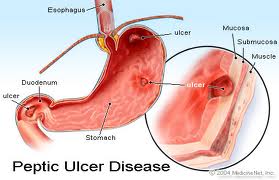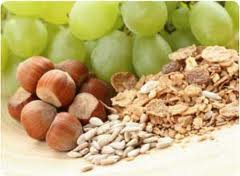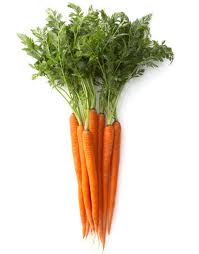On the subject of digestive health, most of my previous blog posts have focused on Irritable Bowel Syndrome (IBS) and Inflammatory
Contrary to common belief, ulcers are not usually caused by diet or stress. Instead, the leading cause of ulcer disease is due to a bacterium called Helicobacter pylori. The bacteria damage the protective mucosal barrier of certain areas of the gastrointestinal tract, making it easier for acidic digestive fluids to cause damage and inflammation to the gut’s lining. Although a bland diet used to be encouraged for those suffering from ulcers, more current research does not suggest this helps improve symptoms. Although spicy foods are an irritant for some people with ulcers, more emphasis is now being placed on a high fibre diet rich in vegetables and fruit.

For individuals with ulcer disease, consuming foods that are high in dietary fibre may be of benefit because it slows the movement of food and acidic digestive fluids down the gastrointestinal tract during digestion. High fibre diets can also help protect against developing an ulcer.
Vitamin A
Research studies show that individuals who consume a higher amount of vitamin A in their diets have a lower risk of developing ulcers. This could be a consequence of vitamin A increasing the production of mucous in the gastrointestinal tract, as demonstrated by animal studies. Since impaired mucosal defense is one of the ways in which ulcers can develop, this can potentially explain why vitamin A might have a protective effect of preventing the development of ulcers and recurrence of ulcers in individuals with ulcer disease. Good sources of vitamin A include liver, carrots, broccoli, sweet potatoes, kale, spinach, and collard greens.

Emerging research is showing potential benefits of green tea and flavonoid-rich foods on ulcer disease – specifically by inhibiting the growth of H. pylori, the bacteria responsible for most causes of ulcers. More conclusive research still needs to be done in this area, but consuming a higher amount of flavonoid-rich foods won’t hurt as they have many health benefits. Foods rich in flavonoids include garlic, onions, and colourful fruit and vegetables such as cranberries, strawberries, blueberries, broccoli, carrots, and snap peas.
Avoiding or Limiting Coffee and Alcohol
Both caffeinated and decaffeinated coffee can increase acid production, and exacerbate symptoms in individuals with ulcer disease. Alcoholic beverages can erode the protective mucous lining along the gastrointestinal tract and lead to further inflammation and bleeding. Due to these reasons, both alcohol and coffee should be limited or avoided to minimize symptoms.
Although increasing your intake of fibre, vitamin A, flavonoid-rich foods and decreasing your intake of caffeine and alcohol can help improve symptoms of ulcer disease – it doesn’t stop here. It is also important to assess your individual tolerance as certain foods trigger symptoms in one individual, but not the next, and vice versa. Visit a registered dietitian for more advice and guidance to find a diet that works best for you.


